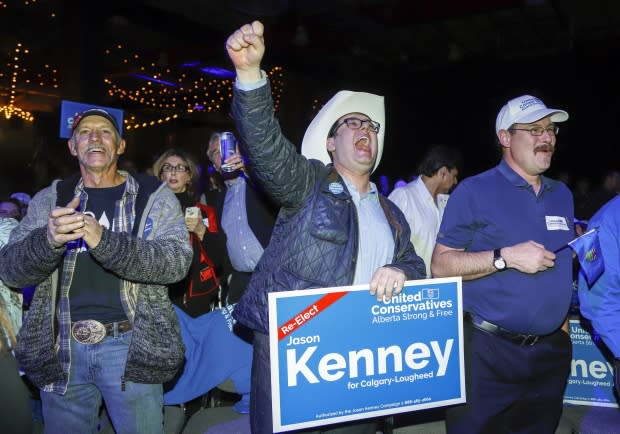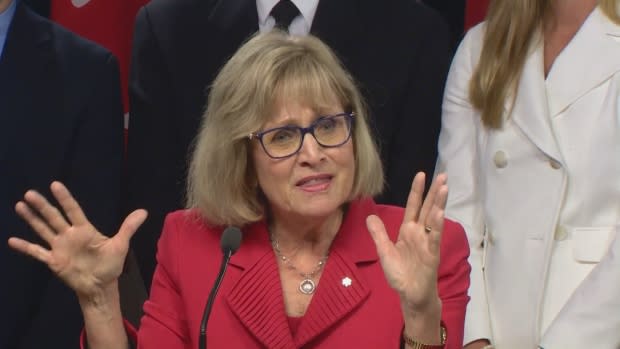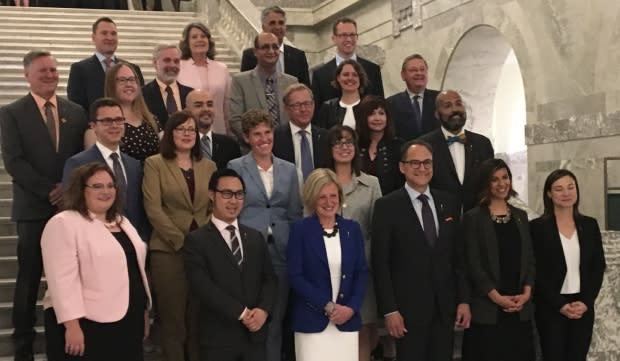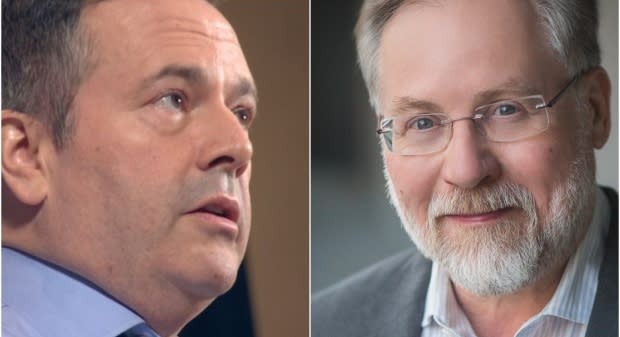OPINION | Why Kenney's honeymoon popularity may last less than 9 months

Jason Kenney should savour these days. Alberta's new premier likely won't get any more popular than he is now.
Sure, there will be a honeymoon — but it probably won't last long.
Kenney's recent electoral victory is, without question, impressive. The United Conservative Party won 55 per cent of the vote, ousting Rachel Notley's NDP after one term. That's better than Ed Stelmach's landslide victory in 2008, where the Progressive Conservatives captured 53 per cent of ballots cast.
But rarely do winning politicians remain as popular as they were on election day. And even before he became premier, Kenney wasn't the most popular politician around, with one poll in March suggesting 44 per cent of Albertans approved of him and 42 per cent did not. So, before Kenney made any tough decisions, he was roughly as popular as Notley after she governed the province for four years during tough economic times.
All politicians inevitably disappoint voters. Kenney is already under fire from Rebel Media for the choice of one of his advisors.
And long-time political watchers think the new premier faces challenges — including big public expectations about his ability to kickstart the sluggish economy, the expected bruising fights with public sector workers and Ottawa, a unified and singular opposition, and potentially even Kenney's own political style — that will likely eat into his political capital with voters.
But, for a while at least, the public will cut Kenney some slack.
The honeymoon period
Undoubtedly, there's goodwill and enthusiasm for the new UCP government — the promise of change and better times.
After years of an intractably sluggish economy, there's real hope that Kenney can deliver on his vow to "focus relentlessly on creating good jobs, growing the economy and building pipelines."
In his victory speech on election night, Kenney declared "help is on the way and hope is on the horizon" for struggling and unemployed Albertans.
There's "a glow that comes from winning," said political communications scholar David Taras, the Ralph Klein chair in media studies at Mount Royal University in Calgary.
"The expectation is that he'll be the great deliverer in terms of jobs and the economy."

And Kenney has made some big economic promises.
On his first day as premier, Kenney pledged to "focus relentlessly on creating good jobs, growing the economy and building pipelines." He's vowed to cut taxes, streamline regulation and attract new investment to the province.
The UCP, formed in 2017 when the Progressive Conservatives and Wildrose merged, plans to cut Alberta's corporate tax rate from 12 per cent down to eight per cent by 2022. Calling it a "job creation tax cut," Kenney vowed the move will spur more investment in Alberta.
Kenney also recently ratcheted up the pressure on the federal government to change its plans to overhaul environmental assessment legislation that, among other things, governs how national pipelines get built, warning of a "growing crisis of national unity" if the federal government doesn't change course. And, just recently, Senate committees did chart new courses for both Bill C-48 and Bill C-69.
But what if the economy doesn't kick into high gear?
Economic expectations
The latest forecast for oil and gas well drilling shows no sign of improving and dozens of companies remain in a precarious position. Some economists have even mused in recent months about another recession.
There's no guarantee things will improve just because there's a new government.
So, what if the economic headwinds don't abate?
Angry people can help you win elections — but governing them is tricky.
Taras says an already grumpy public won't be patient for too long, maybe giving Kenney only six or nine months to heat up Alberta's stubbornly sluggish economy.
"There's this power of expectations," Taras said. "If he doesn't deliver, then the tower comes crashing down."
Calgary-based pollster Janet Brown also thinks impatient voters want to see economic prosperity return to Alberta "in a matter of months." And Kenney's signature economic promise — ending what he what he repeatedly called the NDP's "job killing carbon tax" — may end up disappointing many Albertans in the coming months.

The new government's first order of legislation, Bill 1, proposes killing the carbon tax at the end of this month. But axing the provincial carbon tax triggers a federal one. Already Ottawa has levied its own carbon tax on fossil fuels in provinces such as Ontario, Manitoba, New Brunswick and Saskatchewan, which don't have their own price on carbon.
So, Alberta won't collect a carbon tax — but Albertans will still have to pay a carbon tax. That will probably be hard to swallow for many voters.
And even if Alberta's economy starts cooking again, it could become a double-edged sword for the new premier, warns Brown.
The economy cuts both ways
If Kenney does manage to overcome all or most of the economic challenges and Alberta's finances improve, then public attention — and the issues that the premier is judged by — will likely also change.
Voters can be fickle.
In 2015, when the NDP ended the Progressive Conservatives' 44-year reign, public opinion research showed Albertans were worried about health care and education. They felt the PC dynasty had failed to adequately manage the province's hospitals and schools.
So, if the economy improves, voters may once again want a leader who can fix health care and education.
"They might look at Jason Kenney and say, 'Thanks for improving the economy, but we need a different kind of leader now,'" said Brown.
And balancing Alberta's budget could erode public support for Kenney and the UCP.
Meanwhile, the province faces some daunting health care challenges.
Over the last 30 years, costs have ballooned and now nearly 40 per cent of every dollar the Government of Alberta spends goes to health care. Two years ago, Alberta's auditor general stressed the price tag for health was growing twice as fast as the rest of government spending and some economists have warned the province can't afford how much it's spending on health.
Kenney recently tapped a former Saskatchewan NDP finance minister to sort out how Alberta can balance its budget — without raising taxes. At the time of her appointment, Janice MacKinnon called Alberta a "big-spending province" with a need to "get that spending under control."

But the UCP committed during the election to "maintaining or increasing health spending."
Still, health-care unions are worried about cuts.
Brown and Taras both think freezing spending or cutting costs will inevitably eat into Kenney's popularity.
Albertans who voted UCP, Brown added, may have been OK with hypothetical belt tightening during the recent election campaign, but that could change if nurses start getting laid off or class sizes grow in public schools.
"They may not be quite so happy when they find out the specific things that this government's going to cut," said Brown.
Cost cutting will, undoubtedly, put him at odds with public sector workers such as teachers, nurses and doctors.
"It's one thing," said Taras, "to think in the abstract that we're going to have to tighten our belts, but when it's translated into emergency room [wait] times and lineups for surgeries and large class sizes and projects that don't get off the ground ... then attitudes can change very quickly."
And then there are the two dozen NDP MLAs in opposition, who could turn out to be a thorn in Kenney's side.
An almost unprecedented opposition challenge
For much of the Progressive Conservative dynasty, it was hard to imagine the opposition (New Democrats, Liberals, Wildrose) as the government. Mostly, the ruling PCs held all but a handful of seats.
Not now.
When the 30th Alberta legislature convenes for the first time on Tuesday, the Official Opposition will hold 24 of the 87 seats — nearly 30 per cent — and be led by a former premier. Former NDP cabinet ministers will also be grilling current cabinet ministers during question period.

Alberta politics is about to get a lot more competitive.
The house could be "fireworks," Taras predicts.
"It could be, you know, a daily battle in the house and question period could be … a prolonged war," he said.
And the NDP may want to highlight differences in the UCP's ranks.
A United Conservative Party divided
The opposition's scrutiny could expose vulnerabilities in Kenney and his caucus.
When the UCP, themselves, were in opposition — particularly, with polls showing them on track to win — the party's MLAs and members were motivated to keep their internal politics in-house.
But the UCP represents a merger of two very different parties with divergent positions on a lot of things, especially social issues.
UCP MLA Mark Smith came under fire during the recent election campaign for comments he made in a 2013 sermon about "homosexual love." Kenney, a social conservative, stood by Smith but took heat from conservative radio host Charles Adler.

There is real division about LGBTQ issues in the party. Despite impassioned pleas from three MLAs, a majority of UCP members passed a motion at their inaugural convention last May, supporting a parent's right to be informed if their child joins a gay-straight alliance at school.
Brown wonders if Kenney will be able to keep his diverse group of supporters unified.
"That's, I think, where things could start to get really challenging for Jason Kenney," she said.
And the intense spotlight of governing has a way of revealing a politician's character.
Governing, said Taras, requires compromise.
The NDP, for example, promised in the 2015 election campaign to review Alberta's royalty rate structures.
Industry expected the review would hike rates but Notley later said "times have changed" and so did her thinking about raising taxes on the energy industry.
"Governing takes admitting that you're wrong. Governing takes changing directions sometimes," added Taras, who wonders if Kenney can do that.
The 'S' word
During his tough interview with Adler during the election campaign, the host asked Kenney several times to apologize for his efforts in 1980s San Francisco to prevent dying AIDS patients from visiting with their partners. Kenney wouldn't budge, only conceding that he "regret[ed] many things he did as a young man."
Undoubtedly, the next few years will test if Kenney can say sorry.
Former PC premier Ralph Klein had a deft ability to get out of the doghouse when he angered voters.
The plain-spoken premier was a gifted charmer with whom voters could relate. He was the beer-drinking, smoking, working-class champion who loved a good time. And many voters loved him.

His everyday populism — targeted at pleasing the iconic but fictional "Martha and Henry" couple he invented as a representation of average Albertans — endeared him to voters. And that popularity helped when he was cutting government spending.
And there was real power in a Klein apology.
The public forgave his gaffes and missteps. In 2001, for example, an intoxicated Klein threw money at an Edmonton homeless man, telling him to get a job. Tearful, he later apologized and vowed to deal with his drinking problem.
The admission made him relatable. Voters largely forgave him.
Klein was "like a cat on a hot tin roof who would land in the right place," said Taras, who isn't sure Kenney has the same skills.
Brown, who did extensive polling on Klein and his policies, has her doubts, too, about Kenney's ability to get out of political hot water in the same way as the former premier.
She said Klein, who revelled in being called Ralph, had a common touch.
Kenney, she said, "doesn't have the sort of folksy likability that Ralph Klein did."
"People thought that Ralph was trying to achieve what he felt ... was best for Alberta, that Alberta was his top priority," she said. "And people don't necessarily feel that Jason Kenney is in tune with the average Albertan the way that they felt Klein was in tune with the average Albertan."

Brown's polls and focus groups suggest Alberta voters don't have the same sort of affinity for Kenney that they had for Klein.
Even if the economy turns around, Brown wonders if Kenney could end up being the Alberta equivalent of Winston Churchill, the British prime minister and war hero who unexpectedly lost the general election in 1945 after leading the country through the dark days of the Second World War.
Alberta's economy could recover. Kenney could get the credit.
But in 2023, Brown said other issues may be top of mind for voters, who might say to Kenney: "Thanks for getting the economy back on track — and now we need a different type of leader."
After all, as the 2015 election demonstrated, Albertans are willing to elect more than just conservative governments.
This column is an opinion. For more information about our commentary section, please read this editor's blog and our FAQ.
The Road Ahead is CBC Calgary's special focus on our city and province as they pass through the crucible of the downturn: the challenges we face and the possible solutions as we explore what kind of future we want to create. Have an idea? Email us at: calgarytheroadahead@cbc.ca
More stories from the series:

